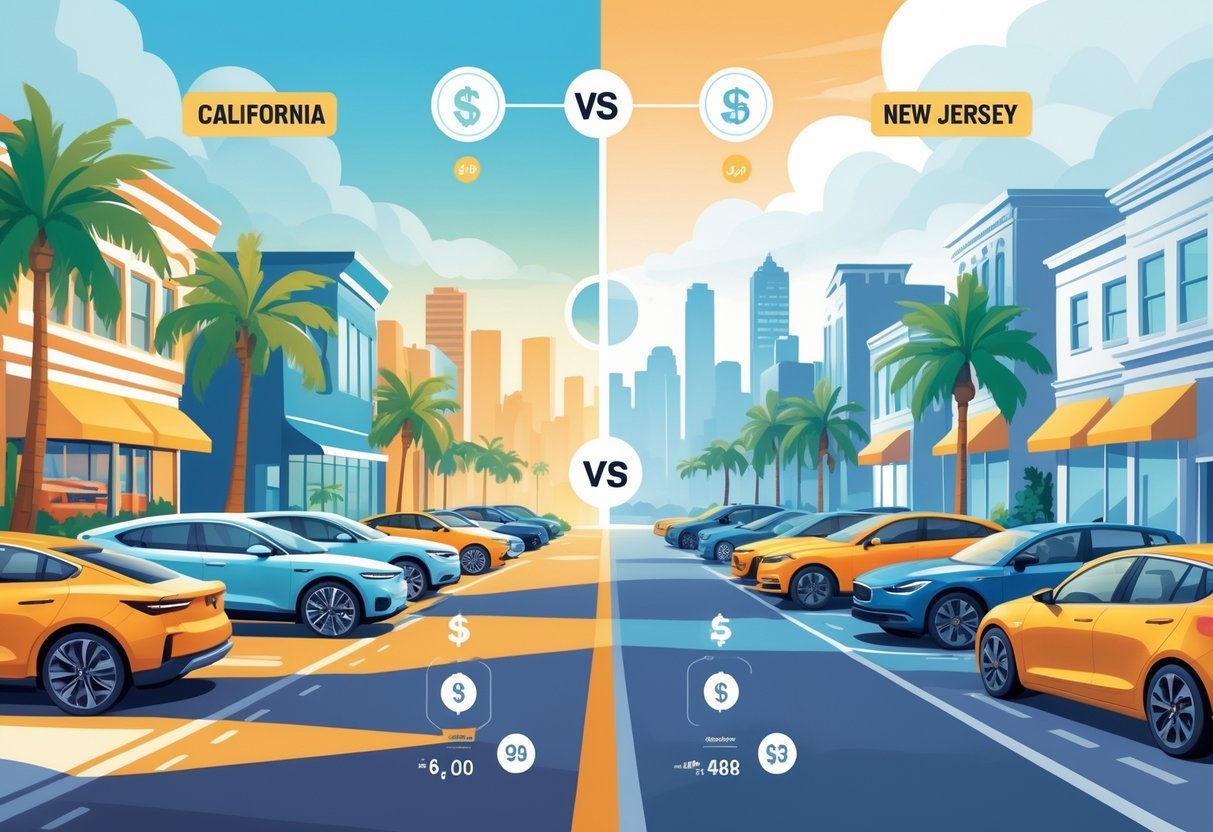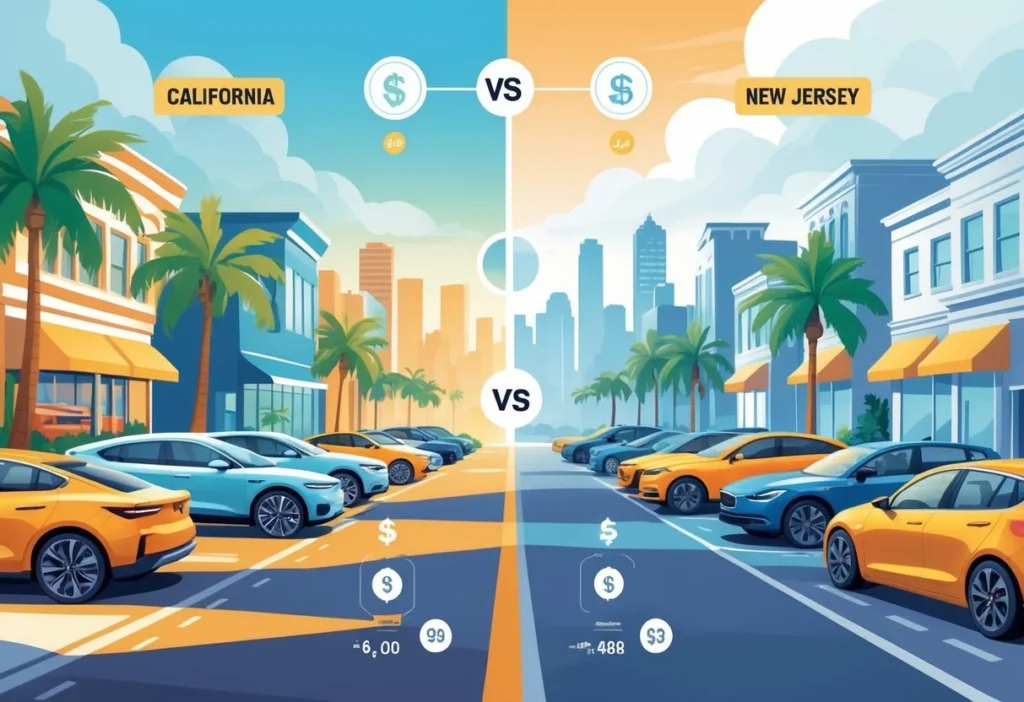Deciding whether to buy a car in California or New Jersey in 2025 isn’t as simple as it sounds. You’ve got to weigh several costs and regulations. Overall, New Jersey usually means you’ll spend less, mostly because their taxes and fees aren’t as high as California’s. For most folks, that makes New Jersey the wallet-friendly choice.

But it’s never just about the numbers, right? Registration, local taxes, and what’s actually available on the lot can shake up your plans.
California might sting a little more upfront, but you’ll see way more options—especially if you’re after a new or electric car. Buyers should think about what matters most to them before making the call.
Plenty of people also care about how much paperwork they’ll need to wade through or what hoops they’ll jump if they buy out of state. Knowing the details can help you avoid headaches and maybe save some cash in 2025.
Key Takeaways
- You’ll generally spend less buying a car in New Jersey than in California.
- California’s got a bigger variety, especially for new or electric vehicles.
- Compare taxes, fees, and local rules before picking a state.
Comparing California and New Jersey for Car Buying in 2025
Prices and fees don’t look the same in California and New Jersey. Each state has its own quirks that can change your total bill.
You’ll also notice differences in what cars are actually on the market, depending on demand and which dealers operate nearby.
Key Differences in Pricing and Fees
California hits buyers with higher registration and documentation fees. You might pay $150 to $300 just for registration there. In New Jersey, it’s usually $60 to $100.
Documentation fees in California often land around $80 to $100. New Jersey sticks closer to $50 to $75.
Sales tax is another big one. California’s can jump as high as 9.5% in certain places, while New Jersey tops out at about 6.625%. That’s a meaningful gap if you’re buying anything pricey.
California doesn’t sit among the cheapest states for car buying. New Jersey sits a bit closer to the bottom of the fee ladder.
Market Trends and Vehicle Availability
California leads the pack when it comes to electric and hybrid vehicles. State policies push clean energy, so you’ll find more new and used EVs there than in New Jersey.
New Jersey still leans toward traditional gas cars, though hybrids are slowly gaining ground (hybrid models). If you want an electric car, California’s got you covered better.
Dealers in California sometimes throw out more promotions and discounts just because the market’s bigger. But high demand can keep prices up anyway.
New Jersey’s smaller market means fewer choices, but you might score a better price on popular models.
Understanding Total Car Costs: Taxes, Registration, and Documentation Fees
Buying a car isn’t just about the sticker price. You’ve got to factor in taxes, registration, and dealer paperwork fees.
These extras can really add up, and they’re different in California and New Jersey.
State Sales Tax Impacts
California’s base sales tax starts at 7.25%. Local taxes can push that up to 9.75% in some places.
Sales tax applies to the whole purchase price, even with a trade-in if the value’s low.
New Jersey’s sales tax sits at 6.625%. If you trade in your old car, they won’t charge tax on that value (trade-in vehicles), which is a nice break.
Both states calculate sales tax differently depending on trade-ins and where you live. But in general, California will take a bigger bite.
Registration Fee Structures
California bases registration fees on the car’s value, weight, and location. Fees can start at $60 but climb to several hundred bucks for new or luxury cars.
You’ll pay a vehicle license fee every year, based on the car’s value.
New Jersey keeps it simpler. Their registration fees depend on weight and run from $46 to $87 for most passenger vehicles. Electric vehicles sometimes get a break.
So, California’s system is pricier and more complicated. New Jersey keeps it straightforward and cheaper.
Dealer Documentation Fees
Dealers charge documentation fees to handle the paperwork. California usually caps these at $85 to $100, but some dealers push right up against that limit.
In New Jersey, dealers can charge more—often $200 to $400. There’s less regulation, so it really depends on the dealer.
Either way, doc fees add to your total cost. In New Jersey, you’ll probably pay more for this piece.
Out-of-State Car Buying: Can Other States Beat California or New Jersey?
Some states offer lower taxes or fees, making them look tempting compared to California or New Jersey. But every state has its own rules, so it’s not always a slam dunk.
Knowing the ins and outs can help you figure out if buying out of state is actually worth it.
Oregon: No Sales Tax Advantage
Oregon stands out because it doesn’t charge sales tax. You pay the car’s price—no extra tax at the time of purchase.
That can save you a lot on a pricey car.
But here’s the catch: you usually need to live or work in Oregon to register your car there. If you don’t, you might still owe taxes when you register the car back home.
Oregon’s purchase fees aren’t high, but registration rules matter if you want to dodge extra costs later.
New Hampshire: Tax Benefits for Buyers
New Hampshire also skips the state sales tax, which is great for buyers. The total at the dealership is lower than in California or New Jersey.
If you don’t live in New Hampshire, though, you’ll probably pay a use tax when you register the car at home. For residents, it’s a solid deal.
Registration fees are pretty reasonable here. Out-of-state buyers with proof of residence can benefit, but always check for taxes back home.
Montana and Delaware: Additional Low-Cost Options
Montana and Delaware both skip sales tax and keep registration fees low. Montana draws in buyers looking to save on taxes.
Delaware has no sales tax and low fees too. You pay the car’s price and not much else.
Both states require proof of residence if you want to register your car there. If you try to register elsewhere, you might face penalties or owe extra taxes.
| State | Sales Tax | Registration Fees | Notes |
|---|---|---|---|
| Oregon | 0% | Moderate | Best for residents |
| New Hampshire | 0% | Moderate | Use tax may apply elsewhere |
| Montana | 0% | Low | Popular for tax savings |
| Delaware | 0% | Low | Requires residency proof |
Additional Factors Impacting the Best State to Buy a Car
Other things can tip the scales between California and New Jersey. Insurance rates, what cars are actually available, and long-term ownership costs all play a part.
Insurance Premium Variations by State
Insurance usually costs more in California. Heavy traffic and more accidents push rates up.
New Jersey often has lower premiums, thanks to stricter rules and less crowded roads in many spots. Still, some cities in New Jersey have rates close to California’s.
Always get quotes based on where you live, your driving record, and what car you want. California sometimes requires extra coverage, like uninsured motorist insurance, which can bump up your bill.
Vehicle Selection and Dealership Networks
California’s got way more electric and hybrid choices. State incentives and demand mean dealers carry more EV models, and charging stations are everywhere.
New Jersey’s network for electric vehicles is smaller, but it’s growing (electric vehicles). Gas cars still rule, though the market’s shifting.
What’s actually on the lot can affect price and waiting time. In California, you’ll see more new brands and tech. Sometimes, you’ll even find better lease deals.
Long-Term Ownership Costs
Owning a car in California often means higher registration fees and more frequent emissions checks. Strict smog rules can make maintenance pricier.
New Jersey’s registration fees are lower, and emissions testing isn’t as tough or as often. That can keep yearly costs down.
Fuel is usually more expensive in California, and maintenance can add up fast. New Jersey’s lower fuel and registration fees help keep your budget in check.
How to Make an Informed Decision When Buying a Car in 2025
Picking the right car isn’t just about the car itself. You need to know your budget and understand the rules in each state.
Assessing Your Personal and Financial Needs
Start by making a list of what you want—size, fuel economy, safety features, all of it. Set a max price before you even start shopping.
Think about how you’ll pay. Cash or loan? Interest rates and loan terms can really change the math, so compare your options.
Insurance rates can surprise you, depending on the car and where you live. Check them early so you know what you’re really signing up for.
Navigating Legal Requirements Across States
If you’re trying to choose between California and New Jersey, you really need to know the legal steps. Both states ask you to register your vehicle, but the fees and timelines don’t always match up.
California’s emissions standards are pretty strict. You’ll have to get your car to pass a smog check before you can register it.
New Jersey also checks emissions, though their rules and how often you’ll need a test aren’t quite the same.
Sales tax is another thing—it’s usually higher in California, which can bump up the total price quite a bit.
It’s smart to visit each state’s DMV website to look up the latest info on title transfers, inspections, and paperwork. Getting familiar with these details can save you from headaches, delays, or even fines later on.

